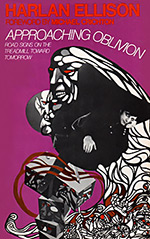
![]() jynnantonnyx
jynnantonnyx
2/27/2012
![]()
Harlan Ellison is one of those writers I not only love to hate but hate to love. He is one of those irascible writers who will permit no criticism of his work to sink in to any depth of his soul. He is also one of those wildly creative writers who is inexplicably able to form fictional worlds entirely different from one another in both setting (hard enough) and tone (nearly impossible). His progressivist politics and often blasphemous hatred of religion infuriates me, but in a seven page tour of a dying earth he can reduce me nearly to tears. Ellison has developed a powerful level of artistic talent, and he is not someone to be taken lightly. Many of the videos of the man one can find online too often depict him simplistically as an old crank—which, to be sure, he is—but this can scarcely explain the stories that could only come from a soul which feels deeply.
Too often Ellison’s wrath gets the better of him. “Knox,” the first story in this collection, concerns a liberal’s wet dream of a conservative racist party turning violent and creating what amounts to a police state. Does Charlie Knox hate every person who is not wholly like himself, or is it truly himself that he hates?, Ellison asks, rather uninterestingly. The way in which Knox memorizes and recites his list of racial slurs might be revelatory in subtler hands, but with Ellison it comes off as a paranoid delusion. The great irony, though, is that Knox is revealed in the end to be telepathically manipulated by alien invaders who wish to destroy our civilization. The worst irony is that Ellison probably didn’t understand the irony at all.
Other times Ellison’s penchant for wallowing in the bizarre and perverse gets the better of him, as in “Catman.” This is the story—if an incoherent narrative set in a incohesive future world can be called a story—which would be better left on the cutting floor, but which (I suspect) Ellison furiously refused to trash simply because a friend recommended that course of action. One wonders if he wrote this story about freakishly Oedipal, immortal, machine-humping characters on a dare. There are discrete elements of creativity within the story that would be the envy of science fiction masters, but which are smashed together with such violence as to nullify any spark of humanity. The less said about it the better.
Even so, there are stories here which are worth tracking down at any cost. “Paulie Charmed the Sleeping Woman” is astoundingly different from Ellison’s usual approach, being the story of a saxophone player grieving for a dead lover, and his attempt to reach her beyond the grave. “One Life, Furnished in Early Poverty” is a nostalgic look back at the influences that make us what we are as adults, and is haunting enough that I can forgive the time-travel conceit (well, a bit). “Hindsight: 480 Seconds” is a wistful look back at the Earth humanity is leaving behind, wondering what we could have done better, and what we still might. These are the stories which make one suspect Ellison of a secret lycanthropic condition: the moon is new, and darkness consumes his soul; it is full, and he sees all the beauty of the night; it wanes, and he sleeps.
I don’t know what to make of this collection. It is distinctively bi-polar, and one must use discretion in approaching its individual parts. I suppose I must recommend it, but with all the cautions listed above intact. Ellison is a wild beast, but now and then you may find him in a sanguine, or at least tolerable, mood.
http://www.worldswithoutend.com/